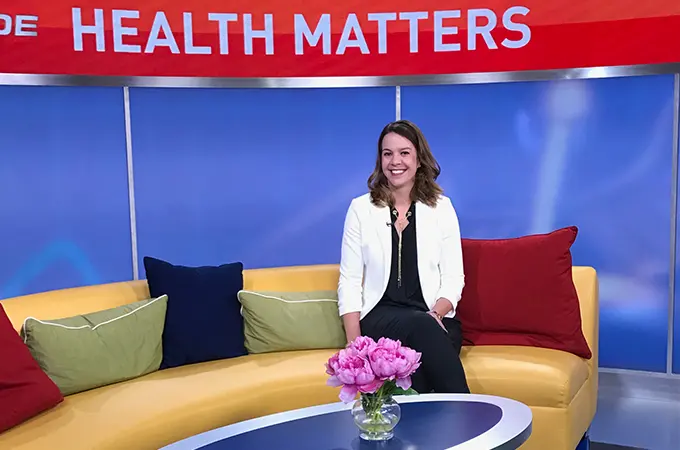In January, Dr. Andrea Reh from Shady Grove Fertility’s Arlington, VA and Fredericksburg, VA offices talked to lifestyle website Brit+ CO about important topics to address before getting pregnant. Picking up on the theme, Good Morning Washington interviewed Dr. Reh for more information. Below are the main key points of what to consider and what to discuss depending on your family building plan, and what your individual needs might be both as an individual or couple.
Have a Plan before You Prepare for Pregnancy
Fertility is something many couples don’t talk about until it becomes a problem, but because of the emotional and financial implications, it’s best to have at least a rough plan for how you would deal with it. It is also easier to have the conversation prior to having issues because you are under less emotional stress and pressure.
If a known condition is present, such as endometriosis, PCOS, family history of early menopause or premature ovarian insufficiency, or known male issues, you may want to discuss options with your OB/GYN at a younger age. Or, if you have been trying to have a baby without success, it may be time to see a fertility specialist.
The Ticking Biological Clock
Dr. Reh acknowledges that, for many couples, there may never be a perfect time to start a family but because of that persistent biological clock, it is important to discuss when the right time to get pregnant with your partner is. With a woman’s age being the #1 factor that impacts fertility potential, Dr. Reh advises women who 35 years old and younger to seek a specialist after 1 year of actively trying to get pregnant, women who are 35 to 39 years old, after 6 months, and within 3 months for women 40 or older.
However, women who have a history of gynecologic problems such as PCOS, irregular menstrual cycles, or other warning signs should seek help sooner.
Research is Key
If you aren’t ready for kids immediately but see a family in your future, look at options like egg freezing. By freezing eggs a woman can preserve her fertility potential and stop the biological clock at that point in time, thus creating options for long-term family planning. If a couple knows they want a family but aren’t ready, more and more are also looking at embryo freezing at the point egg quality is still near its peak.
When researching, be sure to investigate success rates, financial options, and the fertility center’s experience.
Eliminate the Blame Game
Infertility is not a “woman’s problem” or a “man’s problem:” in fact, 40 percent of infertility cases are female-related issues, 40 percent are male, and the remaining 20 percent are unexplained or a combo of both male and female. Because fertility issues can be related to both partners, it’s critical that both partners undergo fertility testing early in the process.
The basic fertility workup provides insight into any existing barriers that might be impeding your ability to conceive. Men will need a semen analysis to determine sperm count and motility (how fast the sperm move) while women will have their reproductive hormone levels tested and to see if their tubes are open to make sure it’s possible for the sperm to get to the egg.
Donor Egg and Donor Sperm
There are various reasons a couple may need to use donor egg and/or donor sperm. Both couples struggling with severe male factor as well as lesbian couples may require a sperm donor, either known or anonymous. Should they use a known or anonymous sperm donor, the lesbian couple would then proceed with basic intrauterine insemination (IUI) fertility treatment.
Donated eggs or known egg donors are used by both heterosexual couples and gay couples. Gay couples will need to use donated eggs as well as a gestational carrier to carry the baby through pregnancy. Heterosexual couples often use donor egg treatment when the woman is unable to use her own eggs for conception; it is often caused by decreased ovarian function, premature ovarian failure, or genetic abnormalities. However, she can still carry a child in her uterus.
Donor egg treatment at SGF offers one of the highest chances of pregnancy even if other infertility treatments were unsuccessful. When paired with our Shared Risk 100% Guarantee Program, patients have an 82% chance of taking home a baby.
If you and your partner would like the opinion of a fertility specialist, or if you are considering freezing your eggs, call 1-877-971-7755 to schedule an appointment with Dr. Reh or any of our other 38 physicians located throughout MD, PA, VA, and D.C.
At Shady Grove Fertility, we’re here to give you the caring support you deserve as you start or grow your family. As a leading fertility and IVF center of excellence, we offer patients individualized care, innovative financial options, over 30 accepted insurance plans, and pregnancy rates among the highest of all national centers. We offer patients the convenience of 19 full-service and 6 satellite locations across Maryland, Pennsylvania, Virginia, and Washington, D.C. More than 1,700 physicians choose Shady Grove Fertility to refer their patients, and more than 96 percent of our patients say they would recommend Shady Grove Fertility’s 35+ physicians to a friend. With 10 Shady Grove Fertility babies born each day, your dream of starting or growing your family is within reach.






